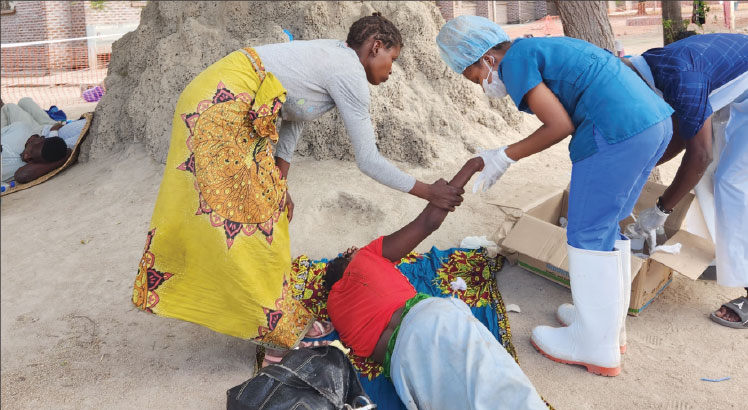Cholera deaths hit record high
Malawi yesterday registered 30 cholera deaths which increased the outbreak’s death toll to 990, the highest recorded in history after exceeding the 968 reported in 2002.
Ministry of Health data yesterday showed that the cumulative cases stood at 29 995 with case fatality rate at 3.30 percent and 1 069 patients in the treatments centres.
Reads the ministry’s update in part: “The new deaths are from Lilongwe nine, Mangochi eight, Balaka five, Blantyre three, Salima two and one each for Chiradzulu, Machinga and Dedza.”
The development comes barely five days after the Ministry of Health expressed fear that the rapid spread of cholera could see the country registering more cases and fatalities than the 2002 outbreak which was statistically the worst since 1998.

The ministry’s Principal Secretary Charles Mwansambo is on record as having said the 2002 outbreak had 33 000 cumulative cases.
“For the current one, we are at around 25 000, but still registering more cases… We may surpass the previous one,” he said.
Meanwhile, the ministry has acknowledged that the country has run out of the oral cholera vaccine, one of the preventive measures, and is discussing with the World Health Organisation (WHO) for a possible supply of more vaccines.
Commenting on the development, Kamuzu University of Health Science public health emergency specialist Adamson Muula said lack of leadership at all levels was worsening the cholera situation.
He said: “And this is not just in one sphere of the Malawian society, but all around. We have always had knowledge as to how to prevent and control cholera.
“In fact, our country was once praised for having controlled cholera so well compared to other countries similar to us, which by the way, aren’t many around.
“When the outbreak started around March 2022, for some reason, we had believed that things would sort themselves out without us doing much. It doesn’t work like that.”
Muula expressed worry that even now that the country is approaching the 1 000 mark in terms of deaths, it is business as usual.
He said: “I don’t know how many more lives need to be lost before we can be serious for once. There is just not enough clean drinking water around for the number of people we have, especially in our towns and cities.
“Our markets continue to be underserved with clean water and toilets. We know this, but we somehow hope we will escape.”
Another public health expert, Professor Maureen Chirwa described the situation as unfortunate and called for collaboration in dealing with the outbreak.
She faulted councils and individuals for not taking the outbreak seriously.
“There is a lot of talk without action. We wonder why someone goes to the office everyday and not do their job. We have the system in place but people have relaxed. People out there know what is happening but their behaviour is not tallying with the knowledge they have,” Chirwa said.
She called on the local government to enhance sanitation and hygiene in towns and cities, raise awareness in rural areas and ensure proper use of toilets by all.
Water and Environmental Sanitation Network (Wesnet) executive director Willies Mwandira appealed to government to prioritise water supply and accessibility as a central strategy in the national response to the Cholera Public Health Emergency.
Minister of Health Khumbize Chiponda has since called on all individuals to play their role by practicing and adhering to the cholera preventive and containment measures if the nation is to contain the outbreak.
“Use of safe water, frequent hand washing with soap, food hygiene as well as early seeking of care when one is experiencing cholera signs and symptoms such as vomiting and diarrhea is key in containing the outbreak,” she said.
The largest cholera outbreak was recorded in between October 2001 to April 2002, affecting 26 of the 28 districts with 33 546 cases and 968 deaths.
The current outbreak started with a case recorded in Machinga in March 2022 and has since then spread like bushfire.





